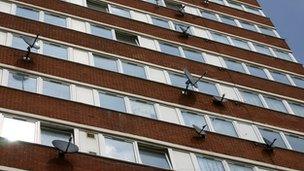Universal Credit: MPs raise fraud concerns
- Published

Housing benefit will come under the umbrella of Universal Credit
The government must give a "swift assurance" that the introduction of Universal Credit will not cause a rise in benefit fraud, MPs have said.
The Communities and Local Government Committee called it "extremely concerning" that detection systems were "still at an early stage".
It also said councils could be left out of pocket by changes.
Ministers insisted strong IT systems were in place for the new benefit, which they say will cut benefit fraud.
Universal Credit will replace benefits including income support and housing benefit with a single payment.
The first trial of the system begins on 29 April in Ashton-Under-Lyne, Greater Manchester.
Millions of existing benefit claimants will be transferred onto the new system over a period of about four years, with the expectation that most people will apply for them and manage them online.
Ministers say Universal Credit will increase incentives to work, reduce in-work poverty and simplify the system.
'Arrears'
But in its report the committee said the Department for Work and Pensions "must provide swift assurance that the transition to Universal Credit will not leave the benefit system vulnerable to fraud".
Its chairman, Labour MP Clive Betts, said: "We heard evidence that ICT systems for fraud detection within Universal Credit were still at an early stage in their development. This is extremely concerning given the advanced state of implementation.
"The government must act to provide assurance that the benefit system will not be left vulnerable to fraud either during or after the transition. And it must do so urgently."
The MPs also raised concerns over plans to provide Universal Credit money to be used for housing direct to claimants - rather than housing associations or councils - suggesting that this could lead to rent arrears.
Mr Betts said: "The government has promised a great deal. It has provided assurances that the reforms will not undermine the financial viability of housing associations.
"It has promised guidelines for local authorities on how 'vulnerable' tenants - who will have their rent paid to their landlord - will be identified.
"It has promised an arrears trigger that will switch payments back to landlords when arrears reach a given level. It has promised to take into account the results of the Direct Payment pilots, which show increased levels of rent arrears, before the rollout of direct payments nationwide. These promises are welcome but must be speedily fulfilled."
'Dire consequences'
Changes which came into place on 1 April, including a cap of £26,000 of benefits per household and payment reductions for those deemed to have a "spare bedroom", would "add to pressures on family budgets and local authority and housing association collection rates", the MPs said.
They called for more "joined-up thinking" by government departments to ensure the changes were as trouble-free as possible.
A Department for Work and Pensions spokesman said: "Universal Credit will cut benefit fraud by £200m a year and we are confident that our IT systems will be strong enough to protect us from the threat of fraud.
"We have been running pilot projects with local authorities to ensure that those people who can't manage with monthly or direct payments get the support they need."
But shadow minister Stephen Timms said the government had failed to heed warnings about the time needed to create the Universal Credit system.
He said: "It now appears that the fraud defences haven't been built, even though the first claims will be processed this month. The consequences could be dire."